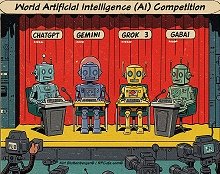Electronics Pioneers & History
- See Full List of AI Topics -
 Edwin Herbert Hall was an American physicist known for his discovery of the
Hall effect,
which has had significant implications in the field of solid-state physics and
electronics. Edwin Hall was born on November 7, 1855, in Great Falls, New
Hampshire, USA. He attended Phillips Exeter Academy and later enrolled at
Harvard University, where he pursued a bachelor's degree in physics. Hall passed
away on November 20, 1938. He was recognized for his contributions to physics,
and received many honors and awards. Edwin Herbert Hall was an American physicist known for his discovery of the
Hall effect,
which has had significant implications in the field of solid-state physics and
electronics. Edwin Hall was born on November 7, 1855, in Great Falls, New
Hampshire, USA. He attended Phillips Exeter Academy and later enrolled at
Harvard University, where he pursued a bachelor's degree in physics. Hall passed
away on November 20, 1938. He was recognized for his contributions to physics,
and received many honors and awards.
In 1879, while still an undergraduate student at Harvard, Hall made a
groundbreaking discovery that would later be known as the Hall effect. He was
conducting experiments to better understand the behavior of electrical currents
in the presence of magnetic fields when he observed that a voltage developed
perpendicular to both the direction of current flow and the applied magnetic
field. This phenomenon came to be known as the Hall effect, and Hall published
his findings in a paper titled "On a New Action of the Magnet on Electric
Currents."
After completing his undergraduate studies, Hall pursued further education
and earned his Ph.D. from Harvard University in 1880. He then embarked on an
academic career, teaching and conducting research. He held positions at several
institutions, including Harvard University, where he was an assistant professor
of physics.
Edwin Hall's discovery of the Hall effect had significant implications
for the field of solid-state physics. The Hall effect is a crucial tool for
studying the electrical properties of materials and has numerous practical
applications. Hall's work laid the foundation for future research in
semiconductor physics and the development of modern electronic devices.
 This content was generated by primarily
with the assistance of ChatGPT (OpenAI), and/or
Gemini (Google), and/or
Arya (GabAI), and/or Grok
(x.AI), and/or DeepSeek artificial intelligence
(AI) engines. Review was performed to help detect and correct any inaccuracies; however,
you are encouraged to verify the information yourself if it will be used for critical
applications. In all cases, multiple solicitations to the AI engine(s) was(were)
used to assimilate final content. Images and external hyperlinks have also been
added occasionally - especially on extensive treatises. Courts have ruled that AI-generated
content is not subject to copyright restrictions, but since I modify them, everything
here is protected by RF Cafe copyright. Many of the images are likewise generated
and modified. Your use of this data implies an agreement to hold totally harmless
Kirt Blattenberger, RF Cafe, and any and all of its assigns. Thank you. Here is
Gab AI in an iFrame. This content was generated by primarily
with the assistance of ChatGPT (OpenAI), and/or
Gemini (Google), and/or
Arya (GabAI), and/or Grok
(x.AI), and/or DeepSeek artificial intelligence
(AI) engines. Review was performed to help detect and correct any inaccuracies; however,
you are encouraged to verify the information yourself if it will be used for critical
applications. In all cases, multiple solicitations to the AI engine(s) was(were)
used to assimilate final content. Images and external hyperlinks have also been
added occasionally - especially on extensive treatises. Courts have ruled that AI-generated
content is not subject to copyright restrictions, but since I modify them, everything
here is protected by RF Cafe copyright. Many of the images are likewise generated
and modified. Your use of this data implies an agreement to hold totally harmless
Kirt Blattenberger, RF Cafe, and any and all of its assigns. Thank you. Here is
Gab AI in an iFrame.
AI Technical Trustability Update
While working on an update to my
RF Cafe Espresso Engineering Workbook project to add a couple calculators about
FM sidebands (available soon). The good news is that AI provided excellent VBA code
to generate a set of Bessel function
plots. The bad news is when I asked for a
table
showing at which modulation indices sidebands 0 (carrier) through 5 vanish,
none of the agents got it right. Some were really bad. The AI agents typically explain
their reason and method correctly, then go on to produces bad results. Even after
pointing out errors, subsequent results are still wrong. I do a lot of AI work
and see this often, even with subscribing to professional versions. I ultimately
generated the table myself. There is going to be a lot of inaccurate information
out there based on unverified AI queries, so beware.
Electronics & High Tech
Companies | Electronics &
Tech Publications | Electronics &
Tech Pioneers | Electronics &
Tech Principles |
Tech Standards Groups &
Industry Associations | Societal
Influences on Technology
|







